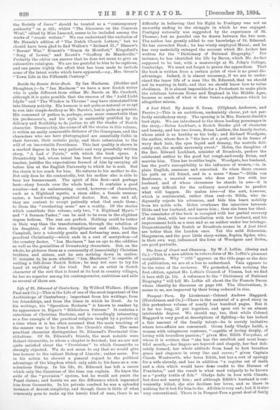A Lost Ideal. By Annie S. Swan. (Oliphant, Anderson, and
Ferrier.)—This is an ambitious, undeniably clever, yet not per- fectly satisfactory story. The opening is in Mrs. Burnett-Smith's best style. We are introduced to the three leading personages in the story,—Helen Lockhart, a Scotch Border girl of character and beauty, and her two lovers, Brian Laicllaw, the family doctor,. whose mind is RS healthy as his body ; and Richard Woodgate, the author, whose face is "the face of a poet, set in its frame of wavy dark hair, the eyes liquid and dreamy, the nostrils deli- cately cut, the mouth nervously sweet." Helen, the daughter of the Rev. Edward Lockhart, minister of Broadrule, prefers the celebrated author to the good but rough-and-ready Brian, and marries him. Then her troubles begin. Woodgate, her husband, has the poet's susceptibility to the influence of women,—is, in plain English, sensuous and conceited. So when there crosses his path an old friend, and in a sense "flame "—Hilda von Reutensee, a married woman who does not live with her husband, and of whose cleverness he stands in awe—it ia not very difficult for the ordinary novel-reader to predict what will happen. He makes love—of the sort, h3wever, which is sentimental, rather than real—to Hilda, who in- dignantly rejects his advances, and bids him learn nobility from his noble wife. Helen overhears the interview between. Hilda and her husband, and leaves him ; thus she loses her ideal. The remainder of the book is occupied with her partial recovery of that ideal, with her reconciliation with her husband, and his improvement both as a man and as an author under her tutelage.. Unquestionably the Scotch or Broadrule scenes in A Lost Ideal are better than the London ones. Yet the mild Bohemian, Hargreaves, and the poor little story-writer, Sophia Ryder, who, in their own way, influenced the lives of Woodgate and Helen,. are good portraits.


































 Previous page
Previous page